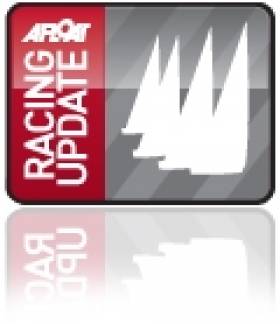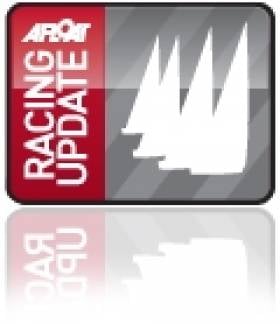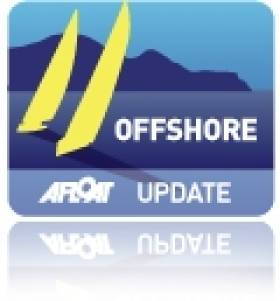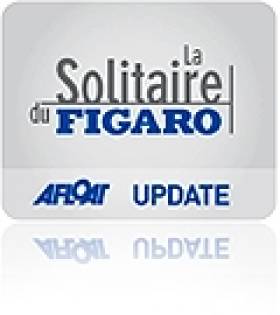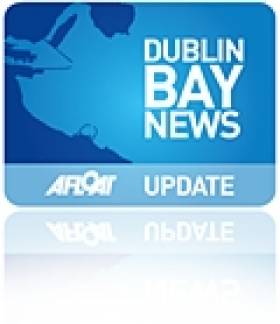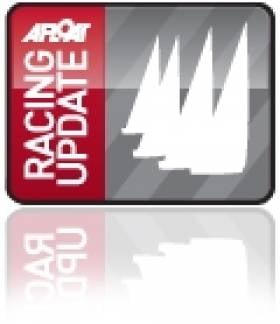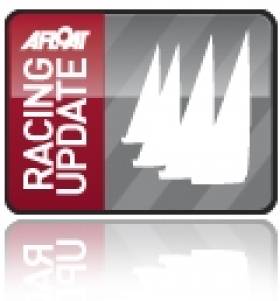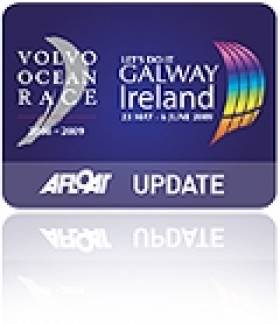Displaying items by tag: racing
#melges – Disappointing and fractious first day of racing in San Francisco, we were OCS (over the line at the start meaning we had to go back and re-start) in one race and had a fight with another boat resulting in a protest in another writes Conor Clarke. Light to medium breeze all day today which is very unusual for SF this time of year and we had big wind shifts which we didn't always call well enough.
Out of three races we have two fifths and a second leaving us third overall overnight but we will have to seriously up our game tomorrow if we are to make ground on the two leaders, Hedgehog and Monsoon. Forecast is for similar freakily light winds tomorrow, a shame, we had always expected and we were looking forward to heavy winds and huge downwind blasts.
Anyway, the boat held up better than the crew, Dave is down in the mouth which is completely bizarre for the most positive man in the world, Profs hands are raw and bleeding and Kate is offering reading lessons to Nathan.
We really have to do better tomorrow, our manoeuvres must be slicker and we must make better choices to improve our position, it is very frustrating when the slightest mistake is so severely punished.
Looking forward to redemption tomorrow, watch this space.
Billy Duane Takes Fourth in World Police & Fire Games, Belfast
#rcyc – Royal Cork yacht club sailor Billy Duane came fourth for Ireland in the World Police & Fire Games sailing event in the Laser standard, on Belfast Lough at the weekend.
The action took place over 3 days at Ballyholme Yacht Club.
The start was delayed on Friday and despite two races starting, they were abandoned due to 30 knot winds. A change of course on the Saturday and a slight drop in wind facilitated four good races with Duane taking two thirds and a couple of fourth places.
Sunday started light but in the space of ten minutes the wind picked up to 18 knots and another 3 good races were had with Duane just missing out on a podium position.
Winner of the event, Jules Ferrer, is the French National Laser Champion and silver medalist Rob Cullen is Canadian champion in the former Olympic Star keelboat fleet.
Ireland-Bound French Yachts Avoid Danger Off Dorset
#Offshore - A fleet of 20 French yachts racing to Ireland narrowly avoided sailing into serious trouble off the Dorset coast earlier this week.
As BBC News reports, UK coastguard authorities scrambled to warn the yachts via emergency broadcast that they were headed towards an exclusion zone set up for a live firing exercise at Lulworth Ranges.
"It looks like there was a slight error made by the French authorities," said a coastguard spokesperson, who confirmed that the yachts were diverted from their dangerous course after contacting the race director.
According to Practical Boat Owner, the yachts were competing in the Normandy Channel Race which began on Sunday 14 April and continues till this Friday evening.
The race route to and from Caen in northern France traverses a triangle across the Celtic Sea, past the most southwesterly tip of Cornwall, via Tuskar Rock and Fastnet Rock.
No Host Port for Ireland in 2013 Figaro
#Figaro - The course for this year's Solitaire du Figaro has been finalised - with no Irish port in the lineup.
The Daily Sail details the four legs of the 44th edition of the prestigious and challenging single-handed offshore race, that will take the fleet from Bordeaux to Porto, Gijón, Roscoff and Dieppe - with no changes from the course unveiled in December.
But despite indications that Ireland would have a host port on the race route, following previous stop-overs on Kinsale, Dingle, Howth, Crosshaven and Dun Laoghaire, it appears this summer's running will be a purely continental event.
Even so, Ireland will be represented among the competing fleet by the brother of last year's Sailor of the Year David Kenefick, who is set to make his Figaro debut.
The Cork Harbour helmsman, who came second in the La Grande Motte recently, discussed race tactics as he steps up his training ahead of the race from 2-23 June.
Yachting Seasickness Survey Surprise as Two-Thirds Take Ill
#SEASICKNESS - A surprising 62% of crew members on board yachts taking part in the Global Challenge experienced seasickness at least once along the 27,000-mile route.
Those are the findings of a survey undertaken by Yachting World of the 223 crew involved in the latest edition of the wrong-way-round-the-world race, as magazine Yachting Monthly reports.
The survey focused on the penultimate leg of the race from Boston to La Rochelle in France. The majority of crew were declared to have no prior disposition to seasickness and were allocated on boats by various other criteria, making the results a "reflection of susceptibility among the population at large".
The results were staggering, with almost two-thirds of crew experiencing seasickness. Though the figures were mostly evenly distributed across the fleet, on one boat the vast majority of those on board were seasick.
Factors that appear to influence the rate of seasickness include age (those older than the peak age of 24 were less susceptible), gender (more women then men were seasick on average) and wind angle (seasickness was less common on downwind stretches).
The sample survey shows that 84% of crew were able to carry on working despite being seasick, but the remaining 16% - localised to a small number of boats - were incapacitated by vomiting and dry-heaving. Recovery time, however, was quick, with even the worst cases improvsing within five days.
Yachting Monthly has much more on the story HERE.
MOD70 European Tour Comes to Dun Laoghaire Next Month
#DUN LAOGHAIRE NEWS - Dun Laoghaire will play host to sailing’s most exciting new global championship series when the MOD70 European Tour visits from Wednesday 5 to Sunday 9 September.
Ireland has hosted many of the world’s top sailing events during 2012 and the welcoming of this new series surely positions Ireland as one of the best sailing locations in the world. The MOD70 fleet - Race For Water, FONCIA, Groupe Edmond de Rothschild, Spindrift Racing and Musandam-Oman Sail - will be hosted by the National Yacht Club (NYC) and the Dun Laoghaire Harbour Company (DLHC), and a five-day family festival will be held on the East Pier to celebrate the arrival of the most innovative racing trimarans in the world.
The festival will include food courts, a farmers' market, Fairtrade and ethnic stalls, craft stalls, street entertainers and vintage amusements.
On Friday 7 September and Saturday 8 September the MOD70s will be competing in Dublin Bay in the Dublin City Race and Speed Match Races, and there will be live commentary from the East Pier. The trimarans will then leave Dun Laoghaire at 3pm on Sunday 9 September for the start of the second leg of the European Tour from Dun Laoghaire to Cascais.
Gerry Dunne, CEO of the DLHC, said: "We are delighted to welcome the world’s most innovative trimarans to Dun Laoghaire Harbour which has witnessed 200 years of maritime history. 1.4 million people walk the East Pier on an annual basis and we hope that the hosting of this global event will attract many more people to our beautiful harbour in September."
The high-speed MOD70 class of trimarans are a new innovation for sailing, and have already proven to be the fastest offshore one-design class in the world. Each MOD70 is completely identical, built from the same moulds, so that success – both inshore and offshore – reflects the skills of the sailing crew and not any technological advantage.
"The National Yacht Club has played host to many world championships and in July this year we co-hosted the ISAF Youth World Championships. We are delighted that the MOD70s has chosen Dun Laoghaire to host a stopover on the European Tour and we look forward to thousands of people visiting Dun Laoghaire to enjoy the spectacle," said Paul Barrington, Commodore of the NYC.
The MOD70 European Tour starts in Kiel, Germany before visiting Dublin, Cascais near Lisbon and Marseille before finishing in Genoa, Italy. Over the five weeks of the MOD70 European Tour the teams will sail nearly 5,000 miles over five offshore stages.
The tour is the second event of the Multi One Championship, following on from July’s inaugural Krys Ocean Race which saw the MOD70s race the Atlantic from New York to Brest in France at remarkable speeds. The first three boats finished within less than two hours after traversing the Atlantic in less than five days, with the winning boat making more than 711 miles in one 24-hour period.
Already the MOD70 fleet has attracted a cross-section of some of the best ocean racing sailors in the world. Michel Desjoyeaux of France has twice won the Vendée Globe solo round the world race and skippers FONCIA. There are more than eight sailors across the different boats who hold round the world records including Britain’s Brian Thompson who sails for Musandam-Oman Sail.
Thompson has more than 20 offshore sailing speed records to his name and was the only Briton on board Banque Populaire V when the giant multihull set a new record for sailing non-stop around the world in January.
Marco Simeoni, president of MOD SA, said of Dun Laoghaire's hosting of the tour: "Local knowledge and local expertise in hosting world-class sailing events is widely appreciated. We thank all the institutions involved in this stopover and we look forward to spending five wonderful days in the heart of the local culture. Sports and entertainment is guaranteed in the Dublin Bay from 5-9 September!"
Programme of events
Wednesday 5/Thursday 6 September
- All day Wednesday: Estimated arrival of MOD70s
- 10am–6pm: Food courts, farmers market, Fairtrade and ethnic stalls, craft stalls, family entertainment, vintage amusements (every day)
Friday 7 September
- 2pm: Dublin City Races and Speed Matches Day 1 (vantage points from the East Pier to Sandycove with live commentary from the East Pier)
- 10pm: Firework display in Dun Laoghaire Harbour
Saturday 8 September
- 2pm: Dublin City Races and Speed Matches Day 2
Sunday 9 September
- 3pm: Start of Leg 2 from Dublin (Dun Laoghaire) to Cascais (vantage points from the East Pier to Sandycove with live commentary from the East Pier)
#RACING ROUND–UP – Ireland's Star pair Peter O'Leary and David Burrows are in the frame at the Star worlds in Hyeres this morning having held the lead after thie first two races, James Espey is Olympic bound in his Laser dinghy following qualification in Germany last night, Alexander Rumball and Rory McStay are joining the Irish ISAF Youth Worlds squad as Ireland's first Catamaran pairing, Offshore J109s continue to dominate on the Irish Sea and ICRA is still seeking support to mount a defence of its 2010 Commodore's Cup victory.
Kinsale's Marcus Hutchinson won the South Coast Squibs, JP McCaldin was on form at the J24 Easterns in Howth, Derek Mitchell was top in Saturday's DBSC Ruffian race, Foynes Yacht Club cruised to Limerick and Andrew Algeo emerged a winner in a class that have changed much more than their racing format.
ISAF Posts Review of Development Symposium
#DEVELOPMENT - The International Sailing Federation's (ISAF) inaugural Development Symposium at Howth Yacht Club recently "promised much in the way of passionate discussion", according to its review of the two-day event.
Presentations were given by Tony Wright, training manager of the Irish Sailing Association, who outlined the ISA's national programme that keeps the focus of the sailor "at the centre of all that they do"; and Simon Jinks who walked through his new Guide to Offshore Personal Safety for Cruising and Racing.
Meanwhile, World Youth Sailing Trust coach Hugh Styles spoke on the subject of cohesive training programmes adding value to international events and leaving a legacy for host nations and teams alike.
Participants from the federation's member nations kept an 'ideas bank' which listed development ideas for future consideration, including a proposal for a development forum for sailing coaches, and using the model of the European Qualifications Framework as a reference for coaching competencies.
New Zealand, South Africa, Iceland and Turkey were also suggested as locations for future symposiums.
For more see the full review of the Development Symposium at the ISAF website HERE.
'The Rules of Racing' Lecture in Castlebar This Thursday
#RACING - Mayo Sailing Club's winter series of lectures continues this Thursday 23 February with a talk by Ed Alcock on 'The Rules of Racing'.
Alcock is racing manager of the Irish Sailing Association (ISA), and his lecture will outline the laws that govern racing by windpower on the water in Ireland, covering classes from yachts and dinghies to windsurfing, kitesurfing and more.
Topics to be covered include rights and obligations on the water, giving way, keeping clear, red flags and protest forms.
Sailors of all craft are invited to attend the evening, and anyone wanting to get involved in racing is also welcome, especially with the 2012 racing season only eight weeks away.
Alcock's talk takes place this Thursday at 7.30pm in GMIT Castlebar. The Galway Advertiser has more HERE.
Jameson Producer Signs On as Volvo Ocean Race Fest Sponsor
#VOLVO OCEAN RACE - The producer of Jameson whiskey has been announced as the spirit and wine sponsor of the Volvo Ocean Race Festival in Galway this summer.
The Galway Independent repors that Irish Distillers Pernod Ricard will be represented at the festival by their brands Jameson, GH Mumm champagne and Brancott Estate wine.
Managing director Pat Magee said: “We are delighted to be the spirits sponsor of the Volvo Ocean Race.
"It is a huge honour for Galway and Ireland to be chosen as the final destination, and a real opportunity for Ireland to show to an international audience our capabilities and successes."
As previously reported on Afloat.ie, organisers of the Volvo Ocean Race stopover this July have promised the event will be "bigger and better" than the previous visit in 2009.
The City of the Tribes competed with 81 locations around the world to be given the honour of hosting the final leg and the closing ceremony of the classic race.
The Galway Independent has more on the story HERE.


























